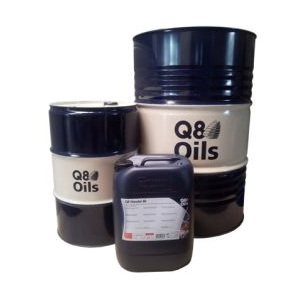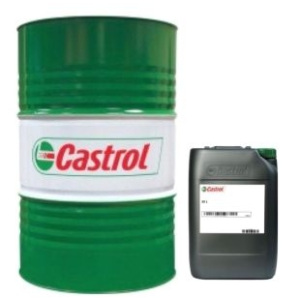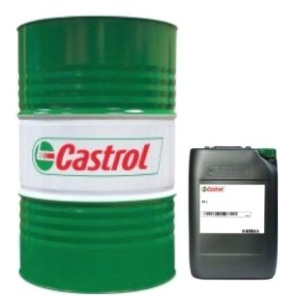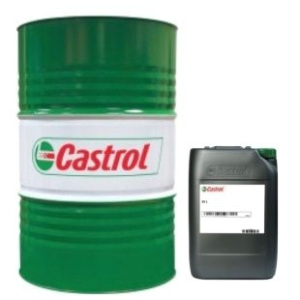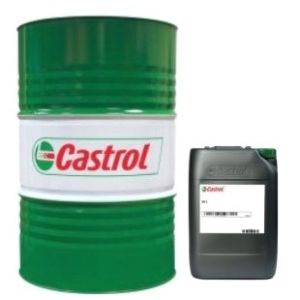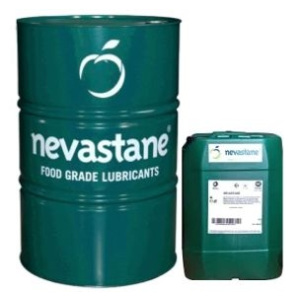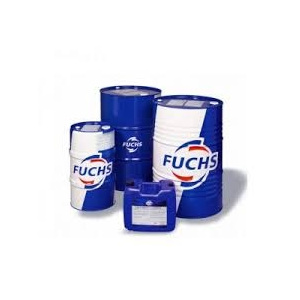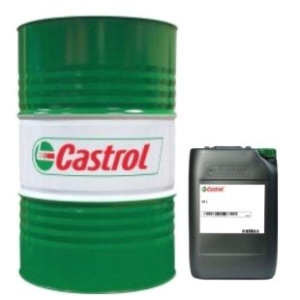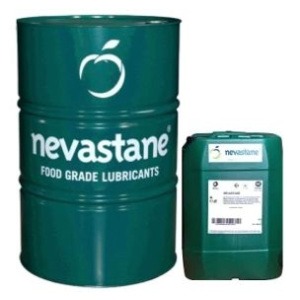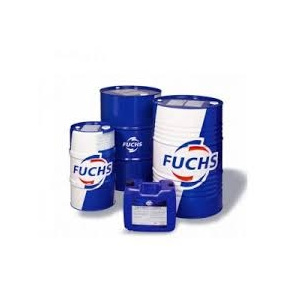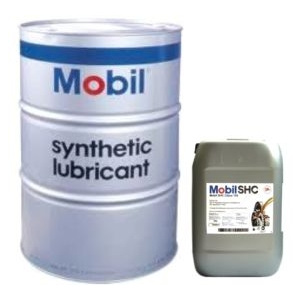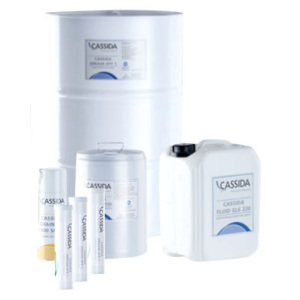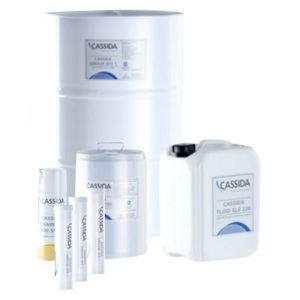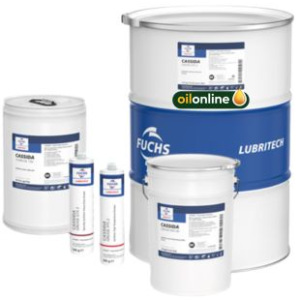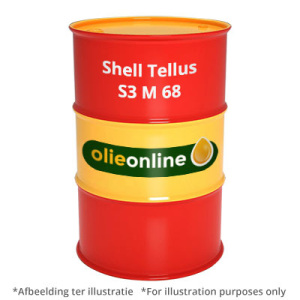Hydraulic oil
-
Total Equivis XLT 22
Quick orderingMore infoTOTAL EQUIVIS XLT 22
Ashless mineral Hydraulic fluid with a very high viscosity index.
Applications TOTAL EQUIVIS XLT 22
- EQUIVIS XLT is an hydraulic fluid designed for outdoor equipments operating under extremely low temperatures.
- The very high viscosity index of EQUIVIS XLT extends the temperature operating window of the hydraulic systems.
Your advantage! Price of TOTAL EQUIVIS XLT 22 drops automatically in larger quantities.
Show moreStarting at: £ 5.41 / L -
Q8 Heller 46
Quick orderingMore infoQ8 Heller 46
Applications
Q8 Heller 46 is designed for use in off highway equipment and other hydraulic systems exposed to wide temperature fluctuations.
References
Q8 Heller 46 meets the requirements of most off highway equipment manufacturer. The zinc based additive package meets Denison HF-0, HF-1 and HF-2 requirements
Summary of Main Features and Benefits Q8 Heller 46
Optimum anti-wear performance, based on a zinc diakyldithiophosphate additive
Wide application temperature range through low pour point and outstanding low and high temperature viscosity characteristics
Trouble-free operation due to the unique combination of outstanding demulsibility, foam, air release, hydrolytic stability and filterability
Long term stable fluid viscosity through excellent shear stability characteristics of the selected viscosity index improver
Show moreStarting at: £ 2.46 / L -
Castrol Hyspin HVI 68
Quick orderingMore infoCASTROL HYSPIN HVI 68 previously Castrol Vario HDX 68
High Viscosity Index anti-wear Hydraulic oils
Application CASTROL HYSPIN HVI 68
Hyspin HVI 68 oils are intended for severely stressed hydraulic systems requiring a high level of anti-wear performance and fine filtration. In addition, Hyspin HVI 68 exhibits excellent corrosion protection as well as outstanding thermal and oxidative stability. Hyspin HVI 68 has excellent hydrolytic stability and separates rapidly from water contamination.
Hyspin HVI 68 contains a shear stable additive system which helps to maintain the viscosity characteristics of the product over a wide temperature range, even during prolonged use, and imparts a very low pour point which enables the product to be used in cold environments.
Your advantage! Price of CASTROL HYSPIN HVI 68 drops automatically in larger quantities.
Show moreStarting at: £ 3.82 / L -
Castrol Hyspin HVI 100
Quick orderingMore infoCASTROL HYSPIN HVI 100
High Viscosity Index anti-wear Hydraulic oils
Application CASTROL HYSPIN HVI 100
Hyspin HVI 100 oils are intended for severely stressed hydraulic systems requiring a high level of anti-wear performance and fine filtration. In addition, Hyspin HVI 100 exhibits excellent corrosion protection as well as outstanding thermal and oxidative stability. Hyspin HVI 100 has excellent hydrolytic stability and separates rapidly from water contamination.
Hyspin HVI 100 contains a shear stable additive system which helps to maintain the viscosity characteristics of the product over a wide temperature range, even during prolonged use, and imparts a very low pour point which enables the product to be used in cold environments.
Your advantage! Price of CASTROL HYSPIN HVI 100 drops automatically in larger quantities.
Show moreStarting at: £ 3.82 / L -
Castrol Hyspin HVI 32
Quick orderingMore infoCASTROL HYSPIN HVI 32 previously Castrol Vario HDX 32
High Viscosity Index anti-wear Hydraulic oils
Application CASTROL HYSPIN HVI 32
Hyspin HVI 32 oils are intended for severely stressed hydraulic systems requiring a high level of anti-wear performance and fine filtration. In addition, Hyspin HVI 32 exhibits excellent corrosion protection as well as outstanding thermal and oxidative stability. Hyspin HVI 32 has excellent hydrolytic stability and separates rapidly from water contamination.
Hyspin HVI 32 contains a shear stable additive system which helps to maintain the viscosity characteristics of the product over a wide temperature range, even during prolonged use, and imparts a very low pour point which enables the product to be used in cold environments.
Your advantage! Price of CASTROL HYSPIN HVI 32 drops automatically in larger quantities.
Show moreStarting at: £ 4.32 / L -
Castrol Hyspin HVI 46
Quick orderingMore infoCASTROL HYSPIN HVI 46 previously Castrol Vario HDX 46
High Viscosity Index anti-wear Hydraulic oils
Application CASTROL HYSPIN HVI 46
Hyspin HVI 46 oils are intended for severely stressed hydraulic systems requiring a high level of anti-wear performance and fine filtration. In addition, Hyspin HVI 46 exhibits excellent corrosion protection as well as outstanding thermal and oxidative stability. Hyspin HVI 46 has excellent hydrolytic stability and separates rapidly from water contamination.
Hyspin HVI 46 contains a shear stable additive system which helps to maintain the viscosity characteristics of the product over a wide temperature range, even during prolonged use, and imparts a very low pour point which enables the product to be used in cold environments.
Your advantage! Price of CASTROL HYSPIN HVI 46 drops automatically in larger quantities.
Show moreStarting at: £ 3.36 / L -
Total Nevastane SH 32
Quick orderingMore infoTOTAL NEVASTANE SH 32
Compressors, pneumatic and hydraulic oils. Synthetic (PAO) oils, suitable for incidental food contact
Applications TOTAL NEVASTANE SH 32
- NEVASTANE SH oils are recommended in the food processing industries for the lubrication of air compressors, vacuum pumps and hydraulic systems especially operating at low temperatures
- NEVASTANE SH formulation, 100% synthetic, based on PAO, provides superior protection and longer service life to the lubricated equipments.
Your advantage! Price of TOTAL NEVASTANE SH 32 drops automatically in larger quantities.
Show moreStarting at: £ 5.68 / L -
Fuchs RENOLIN MR 15 VG 46
Quick orderingMore infoRENOLIN MR 15 VG 46
Special lubricating and hydraulic fluids with excellent corrosion protection
RENOLIN MR 15 VG 46 field of applications:
RENOLIN MR are lubricating oils for circulation and bearing lubrication, superbly suited for applications in mobile and stationary hydraulic systems where the use of a detergent / dispersant hydraulic oil with low friction coefficients, good stick-slip behaviour and excellent corrosion protection properties is required. RENOLIN MR is also suited for use as high-speed spindle oil, break-in oil, and corrosion protection oil.
Please note!! Price of RENOLIN MR 15 VG 46 drops automatically in larger quantities.
Show moreStarting at: £ 4.44 / L -
Castrol Hyspin HVI 46 D
Quick orderingMore infoCASTROL HYSPIN HVI 46 D
Detergent Hydraulic Oil
Application CASTROL HYSPIN HVI 46 D
Castrol Hyspin HVI 46 D also incorporates lubricity additives to give smooth slideway motion on the combined hydraulic and slideway lubrication systems of some grinding and gear cutting machine tools. Castrol HLP-D fluids contain detergency additives which maintain dirt and oil oxidation products in suspension, preventing them from settling out and forming deposits which could impair the free operation of valves, leading to erratic system operation. Machine tool manufacturer's are increasingly specifying HLP-D fluids such as Hyspin HVI 46 D, having recognised their advantages in increased system reliability.
Your advantage! Price of CASTROL HYSPIN HVI 46 D drops automatically in larger quantities.
Show moreStarting at: £ 4.29 / L -
Total Nevastane SH 46
Quick orderingMore infoTOTAL NEVASTANE SH 46
Compressors, pneumatic and hydraulic oils. Synthetic (PAO) oils, suitable for incidental food contact
Applications TOTAL NEVASTANE SH 46
- NEVASTANE SH oils are recommended in the food processing industries for the lubrication of air compressors, vacuum pumps and hydraulic systems especially operating at low temperatures
- NEVASTANE SH formulation, 100% synthetic, based on PAO, provides superior protection and longer service life to the lubricated equipments.
Your advantage! Price of TOTAL NEVASTANE SH 46 drops automatically in larger quantities.
Show moreStarting at: £ 6.16 / L -
Fuchs RENOLIN MR 3 VG 10
Quick orderingMore infoRENOLIN MR 3 VG 10
Special lubricating and hydraulic fluids with excellent corrosion protection
RENOLIN MR 3 VG 10 field of applications:
RENOLIN MR are lubricating oils for circulation and bearing lubrication, superbly suited for applications in mobile and stationary hydraulic systems where the use of a detergent / dispersant hydraulic oil with low friction coefficients, good stick-slip behaviour and excellent corrosion protection properties is required. RENOLIN MR is also suited for use as high-speed spindle oil, break-in oil, and corrosion protection oil.
Please note!! Price of RENOLIN MR 3 VG 10 drops automatically in larger quantities.
Show more£ 8.50 / L -
Total Nevastane SH 68
Quick orderingMore infoTOTAL NEVASTANE SH 68
Compressors, pneumatic and hydraulic oils. Synthetic (PAO) oils, suitable for incidental food contact
Applications TOTAL NEVASTANE SH 68
- NEVASTANE SH oils are recommended in the food processing industries for the lubrication of air compressors, vacuum pumps and hydraulic systems especially operating at low temperatures
- NEVASTANE SH formulation, 100% synthetic, based on PAO, provides superior protection and longer service life to the lubricated equipments.
Your advantage! Price of TOTAL NEVASTANE SH 68 drops automatically in larger quantities.
Show moreStarting at: £ 7.12 / L -
Mobil SHC 524 UN 3082
Quick orderingMore infoMobil SHC 524
Hydraulic Oils
Mobil SHC™ 524 oils are exceptional performance hydraulic oils formulated from synthesised, wax-free hydrocarbon base fluids combined with a carefully engineered super-stabilised additive system.
Most important applications of Mobil SHC 524 are:
- + Hydraulic systems prone to deposit build-up such as sophisticated Numerically Controlled (NC) machines, particularly where close clearance servo-valves are used
- + Systems employing multi-metal component designs
- + High pressure vane, piston and gear pumps
- + Systems where cold start-up and / or very high operating temperatures are typical
- + Where small amounts of water are unavoidable
- + In systems containing gears and bearings
- + Systems requiring a high degree of load-carrying capability and anti-wear protection
- + Applications where thin oil-film corrosion protection is an asset such as in systems containing moisture
Pay attention! Price of Mobil SHC 524 drops automatically with higher volumes.
Show moreStarting at: £ 9.79 / L -
Fuchs Cassida Fluid HFS 46 - Foodgrade
Quick orderingMore infoCassida Fluid HFS 46
Synthetic hydraulic fluids for food and beverage processing equipment
CASSIDA FLUID FLUID HFS 46 are high performance, anti-wear multi-purpose lubricants with boosted solvency, specially developed for use in machinery used in the food and beverage processing and packaging industry. Cassida Fluid HFS 46 Applications are:
- Hydraulic systems
- Hydrostatic gears
- Plain and anti-friction bearings
- General purpose lubrication including light duty gearboxes
- Circulating oil systems
Show moreStarting at: £ 15.11 / L -
Fuchs Cassida Fluid HF 46 - Foodgrade
Quick orderingMore infoCassida Fluid HF 46 Previous Name: Shell Cassida 46
Hydraulic fluids for food manufacturing machinery
Cassida Fluid HF 46 main applications:
- Hydraulic systems
- Hydrostatic gears
- Plain and anti-friction bearings
- General purpose lubrication including light duty gearboxes
- Circulating oil systems
Cassida Fluid HF 46 are high performance, anti-wear multipurpose lubricants, specially developed for use in machinery used in the food and beverage processing and packaging industry. They are based on a careful blend of synthetic fluids and selected additives chosen for their ability to meet the stringent requirements of the food industry.
Show moreStarting at: £ 13.16 / L -
Fuchs Cassida Fluid HF 68 - Foodgrade
Quick orderingMore infoCASSIDA FLUID HF 68 Previous Name: Shell Cassida 68
Hydraulic fluids for food manufacturing machinery
CASSIDA FLUID HF 68 main applications:
- Hydraulic systems
- Hydrostatic gears
- Plain and anti-friction bearings
- General purpose lubrication including light duty gearboxes
- Circulating oil systems
CASSIDA FLUID HF 68 are high performance, anti-wear multipurpose lubricants, specially developed for use in machinery used in the food and beverage processing and packaging industry.
Show moreStarting at: £ 13.16 / L -
Fuchs Cassida Fluid HF 100
Quick orderingMore infoFuchs Cassida Fluid HF 100 Previous Name: Shell Cassida HF 100
Hydraulic fluids for food manufacturing machinery
CASSIDA FLUID HF 100 main applications:
- Hydraulic systems
- Hydrostatic gears
- Plain and anti-friction bearings
- General purpose lubrication including light duty gearboxes
- Circulating oil systems
CASSIDA FLUID HF 100 are high performance, anti-wear multipurpose lubricants, specially developed for use in machinery used in the food and beverage processing and packaging industry.
Show moreStarting at: £ 13.16 / L -
Fuchs Cassida Fluid HF 32 - Foodgrade
Quick orderingMore infoCassida Fluid HF 32 Previous Name: Shell Cassida 32
Hydraulic fluids for food manufacturing machinery
Cassida Fluid HF 32 main applications:
- Hydraulic systems
- Hydrostatic gears
- Plain and anti-friction bearings
- General purpose lubrication including light duty gearboxes
- Circulating oil systems
Cassida Fluid HF 32 are high performance, anti-wear multipurpose lubricants, specially developed for use in machinery used in the food and beverage processing and packaging industry. They are based on a careful blend of synthetic fluids and selected additives chosen for their ability to meet the stringent requirements of the food industry.
Show moreStarting at: £ 13.16 / L -
Fuchs Cassida Fluid HF 15 - Foodgrade
Quick orderingMore infoCassida Fluid HF 15 Previous Name: Shell Cassida 15
Hydraulic fluids for food manufacturing machinery
Cassida Fluid HF 15 main applications:
- Hydraulic systems
- Hydrostatic gears
- Plain and anti-friction bearings
- General purpose lubrication including light duty gearboxes
- Circulating oil systems
Cassida Fluid HF 15 are high performance, anti-wear multipurpose lubricants, specially developed for use in machinery used in the food and beverage processing and packaging industry. They are based on a careful blend of synthetic fluids and selected additives chosen for their ability to meet the stringent requirements of the food industry.
Show moreStarting at: £ 13.16 / L -
Shell Tellus Zinc Free S3 MX 68 209L
Quick orderingMore infoShell Tellus S3 M 68
Premium Zinc-Free Industrial Hydraulic Fluid
Shell Tellus S3 M 68 main applications:
- Manufacturing and industrial hydraulic systems
- Severe duty hydraulic service
- Marine and mobile hydraulic systems
- Low toxicity towards the environment
Specifications, Approvals & Recommendations
Shell Tellus S3 M 68 fluids are suitable for use with most hydraulic pumps. ·Denison Hydraulics (HF-0, HF-1 and HF-2) Eaton Vickers (Brochure 694) ·Fives Cincinnati P-68 (ISO 68) ·ISO 11158 (HM fluids) ·DIN 51524-2 (HLP oils) ·ASTM 6158 (HM mineral oils) SS 15 54 34 M
Pay attention! Price of Shell Tellus S3 M 68 drops automatically in larger quantities.
Show more£ 2.73 / L
| Shell Hydraulic Oil: | Shell Tellus | Shell Naturelle | |
| Castrol Hydraulic Oil: | Castrol Hyspin | ||
| Q8 Hydraulic Oil: | Q8 Haydn | Q8 Heller | |
| Mobil Hydraulic Oil: | Mobil DTE | Mobil Univis | Mobil Nuto |
| Total Hydraulic Oil: | Total Azolla | Total Equivis |
Introduction
Hydraulic oil, also known as hydraulic fluid, is essential for numerous industrial, agricultural, and mobile machines. Hydraulic oil is often underestimated, which is why OlieOnline is happy to draw more attention to these products. We will address: the differences between various types of hydraulic oil, what to consider when purchasing, the risks of using the wrong oil, and how to know when it needs replacement.
In this article, you'll get a complete overview with answers to all relevant questions, supplemented with recent real-world examples, facts, figures, and current insights from the hydraulics sector. Frequently asked questions are also extensively covered, such as: the difference between hydraulic oil and hydraulic fluid, which oil to choose for an excavator, oil change intervals, key properties of high-quality oil, mixing, purchasing, consequences of using incorrect oil, and how to know when it’s time for an oil change.
What is hydraulic oil and how does it work?
Hydraulic oil is a fluid specifically developed to transmit power within hydraulic systems. By moving this oil through the system, force is applied to components such as pistons, cylinders, or motors to transfer power.
- Power transmission: The primary function of hydraulic oil is to transmit power throughout the system.
- Lubrication: The oil reduces friction between moving parts, minimizing wear.
- Cooling: By absorbing and dissipating heat, the oil prevents overheating of components.
- Corrosion protection: Additives in the oil help protect metal components against rust and other forms of corrosion.
- Contamination control: High-quality hydraulic oil can effectively trap dirt and impurities, improving system performance.
In addition to acting as a power transmission medium, hydraulic oil also provides protection: it prevents metal-to-metal contact, offers lubrication, guards against wear, rust, and corrosion, and dissipates heat. These requirements are often overlooked when selecting hydraulic oil.
Hydraulic applications are common across agriculture, construction, industry, inland shipping, and transport sectors. Therefore, hydraulic oils are of critical importance. To give you an idea of the forces involved: industrial presses can operate at pressures of 700 bar or more. The higher the pressure, the higher the temperature generated in (servo) valves, and the more crucial fine filtration becomes! Tractors and aircraft often have other specific hydraulic oil r
What is the difference between hydraulic oil and hydraulic fluid?
In the Netherlands, the terms ‘hydrauliek olie’, ‘hydrauliekolie’ and ‘hydraulische olie’ are used interchangeably. Linguistically, ‘hydraulische olie’ is sometimes considered the correct term, but in commerce, industry, and technical documentation, all three mean exactly the same. Internationally, the term "hydraulic oil" or "hydraulic fluid" is used. When purchasing, you don’t need to worry about the naming; the specifications and standards (such as ISO VG 46 or DIN 51524 HLP) determine the right choice — not the name. Keep in mind that the quality of a hydraulic oil lies in how long it retains its performance.
Types of hydraulic oil: mineral, synthetic and biodegradable
Every hydraulic oil consists of a base oil combined with additives that are designed to improve specific properties:
- Base oil: Can be mineral or synthetic, depending on the application.
- Additives: These reduce oxidation, limit wear, stabilize viscosity, and promote water separation.
Generally, hydraulic fluids are divided into three main types:
- Mineral: Made from refined petroleum with added anti-wear agents, antioxidants, and rust inhibitors. Most widely used globally (~85%).
- Synthetic: Based on synthetic oil with PAO (polyalphaolefins) — synthetic hydrocarbons used in high-performance lubricants. They are Group IV synthetic oils (API classification) and are made by polymerizing alpha-olefins. Advantages include better performance under extreme temperatures and loads.
- Biodegradable: e.g. Shell Panolin products, specially developed for use in environmentally sensitive areas (like water management, forestry, and nature reserves). Modern bio-oils are mostly ester-based. Saturated esters have a longer service life and are more energy-intensive to produce, hence higher in cost — but they often outperform regular mineral oils.
Hydraulic oils are also categorized by viscosity (fluid thickness), expressed as ISO VG (Viscosity Grade) such as 32, 46, or 68. There are also special-purpose oils, like fire-resistant hydraulic oil (for steel mills or underground mining) and food-grade oil (for food production environments).
Viscosity: what do ISO VG 15, 22, 32, 46 and 68 mean?
The ISO VG value of hydraulic oil indicates its thickness (viscosity) at 40°C. The higher the number, the thicker the fluid. ISO VG 15, 22, and 32 are typically used in light, fast-switching hydraulic systems. ISO VG 46 is common for outdoor equipment (like excavators and cranes), while ISO VG 68 is preferred in heavier systems or where higher temperatures and loads occur. The machine manufacturer determines the correct viscosity class because they know the exact operational forces and temperatures. Follow their guidance to avoid system malfunctions. Typically, the pump type determines the viscosity choice.
Oil that is too thin increases wear, risk of leakage, and power loss. Oil that is too thick slows the system and increases energy use. In practice, choosing the right oil based on machine specifications and working climate is crucial. In Europe, ISO VG 32, 46, and 68 are the most widely used in industrial applications.
Which hydraulic oil do I need for my excavator?
This is a question we are often asked. For excavators, loaders, and other earthmoving machines, manufacturers typically recommend a high-quality mineral hydraulic oil with excellent oxidation stability and strong anti-wear properties. The most commonly used is ISO VG 46 (often referred to as HVLP 46 or HLP 46). For excavators, it is recommended to use a hydraulic oil with a high viscosity index — DIN HVLP instead of DIN HLP — since outdoor temperatures can vary significantly by season.
In hotter climates or under heavier loads (e.g., prolonged summer work or industrial applications), ISO VG 68 or similar is required. Always refer to the user manual or service guide of your machine: manufacturers like Caterpillar, Hitachi, Liebherr, and Volvo clearly state the required viscosity and specification — such as DIN 51524 HLP/HVLP, ISO HM/HV, or brand-specific standards. Some brands even recommend using motor oil as hydraulic oil. That’s not a bad idea, as it may offer certain advantages over traditional hydraulic oils. If in doubt, consult OlieOnline experts. Using the wrong oil can quickly lead to malfunctions and damage, and may void your warranty.
Ask OlieOnline experts for advice if you’re unsure — they will help explain the differences. As we always say: Knowledge is our strength!
How often should hydraulic oil be changed in a hydraulic system?
The oil change interval depends on several factors: operating intensity, system load, environmental conditions (dust, moisture, temperature fluctuations), base oil type, brand quality, and maintenance practices. In industry, the following guidelines are common for mineral-based hydraulic oil:
- Heavy-duty machines: every 2,000 to 4,000 operating hours
- Standard-duty machines: every 3,000 to 8,000 hours
- Agricultural or construction machines used intermittently: at least once per year, or every 2 years maximum — or earlier if there are warning signs (such as discoloration, odor, or foaming).
Visually inspect your oil regularly for color and clarity, or — if possible — have it tested annually in a lab. Good oil management prevents up to 80% of hydraulic failures, based on OlieOnline’s experience.
If your systems are large enough, we can arrange oil analysis. Important: Many manufacturers specify exact service intervals — always follow these closely to maintain warranty coverage!
What are the characteristics of a high-quality hydraulic oil?
A good hydraulic oil combines the following properties:
- Optimal viscosity and viscosity index: stable performance across a wide temperature range
- High oxidation stability: slows aging and prevents sludge or varnish deposits
- Excellent anti-wear performance
- Strong protection against rust, corrosion, and foaming
- Efficient air release (trapped air can cause cavitation)
- Effective water separation and good filterability
- Compatible with sealing materials such as NBR, FKM, and PU
Globally recognized brands invest in R&D and choose premium base oils and additive technologies (anti-wear, oxidation, and rust inhibitors). The quality and quantity of these additives directly impact maintenance costs and the lifespan of hydraulic components.
Can I mix different types of hydraulic oil?
Mixing different hydraulic oils is strongly discouraged by manufacturers and specialists. The reason is that the quality and condition of the existing oil are often unknown.
Combining oils based on different base stocks must be avoided (e.g., mixing mineral oil with synthetic or bio-based oil). The additive systems may be incompatible, leading to chemical reactions or sediment formation.
In emergency situations (e.g., breakdowns or urgent repairs), mixing may be unavoidable. Only do so with oils that meet the same specifications, and flush the system as soon as possible. Never mix zinc-containing oils with ashless (zinc-free) hydraulic oils — chemical incompatibility can cause wear and system failure. Differences in color or smell may also indicate incompatibility.
What should I consider when buying hydraulic oil?
When purchasing hydraulic oil, always consider the following:
- Price vs. quality: cheap oil often results in higher wear and operational costs. Choose a globally recognized brand.
- Viscosity/class (ISO VG 15, 22, 32, 46, 68): must match system, pump type, and climate.
- Standards/certifications (e.g., DIN 51524, ISO 11158): always follow your machine’s recommendation.
- Application: standard, fire-resistant, biodegradable, or food-grade oil.
Ask OlieOnline experts for advice if in doubt — we’re here to help you understand the differences. As we say: Knowledge is our strength!
What are the consequences of using the wrong hydraulic oil?
Using the wrong hydraulic oil (wrong viscosity, additives, or type) can have immediate and serious consequences:
- Accelerated wear of pumps, valves, cylinders, and bearings
- Increased leakage and/or pressure loss
- Damage from cavitation or excessive energy consumption
- Formation of foam, sludge, or varnish
- Clogging of filters and pipes due to faster contamination
- Warranty may be void if incorrect oil use is proven
- The system may eventually seize completely, requiring expensive repairs
Example from the field: if oil that’s too thin is used in a forklift or loader, it may not lift properly (insufficient pressure build-up), and internal wear increases. If the oil is too thick, movements become sluggish and energy use rises.
How can I tell if my hydraulic oil needs replacing?
Old or contaminated hydraulic oil can be recognized by:
- Discoloration — brown, black, milky, or cloudy appearance
- Strong, unusual smell (burnt or rancid)
- Increased foaming or air entrapment
- Reduced system responsiveness (slower, louder, or irregular)
- Filters clogging more frequently
- Lab analysis showing high wear metals, depleted additives, or water contamination
Quick test: place a drop of oil on a white tissue. If you see visible metal particles, muddy or dark color, or a strange smell, change the oil immediately. For professional or high-value systems, periodic lab analysis is essential for predictive maintenance and to avoid unexpected downtime.
Frequently Asked Questions (Hydraulic Oil FAQ)
What types of viscosity grades are available?
The ISO VG standards range from 15 to 460. For most hydraulic applications, ISO VG 15, 22, 32, 46, 68, and 100 are the most commonly used grades.
How is hydraulic oil classified?
Based on ISO/DIN standards: ISO HM and HV (DIN HLP/HVLP). HM/HLP is standard mineral oil; HV/HVLP includes viscosity index improvers for better performance in temperature fluctuations.
Can I use engine oil as hydraulic oil?
In some cases, yes — if the excavator manufacturer explicitly allows it. Normally, engine oil is not suitable for hydraulic systems due to different compositions and additives and may cause damage.
Are biodegradable hydraulic oils just as good?
Yes, they are — but they require more attention when it comes to filtering and moisture control. The presence of water breaks down the oil — this is how it "knows" it has entered the environment.
Does changing the oil more often help prevent clogging?
Yes, timely oil changes help prevent deposits and extend service life (and help avoid 80% of failures).
How should hydraulic oil be stored?
In a dry, frost-free area, in its original sealed packaging and out of direct sunlight — this prevents quality loss.
Where does the quality difference in hydraulic oils come from?
OlieOnline always recommends choosing a globally recognized brand. These companies have the resources for extensive research and cannot afford reputation damage. What matters is that the oil’s protective properties are guaranteed under all speeds and conditions. Not every hydraulic oil delivers this! A major quality difference lies in how LONG and how EFFECTIVELY the oil maintains its performance.
Often, you don’t immediately notice when your oil quality has degraded. Most wear and damage is only discovered afterwards — and you may not realize the cause was poor hydraulic oil.
What is the influence of temperature on hydraulic oil?
Some hydraulic oils have better viscosity stability, meaning they thin out less at high temperatures and remain fluid at low temperatures. High heat accelerates wear. An oil cooler can be a smart investment — but always consider the quality of the hydraulic oil you’re buying.
At high temperatures, carbon particles may form — especially in aged or low-quality oil. These particles can settle on internal parts such as valves and pump components, causing major issues. The quality of the base oil and additive package determines how long the hydraulic oil remains effective.
What is HLP oil?
HLP is a DIN standard. DIN HLP defines the minimum requirements for indoor-use hydraulic oil. Generally, globally recognized brands exceed this HLP standard — but this says nothing about how long the oil will maintain its performance.
Practical examples, statistics, and hydraulic system failures
Hydraulic systems are found in airplanes, excavators, bridges, factories, and even car lifts. Pressure levels vary by application: aircraft often use hydraulic fluid at over 3,000 psi (200+ bar), while presses and lifts can exceed 500–700 bar. According to OlieOnline’s experience and research, around 80% of all hydraulic failures are caused by contaminated or incorrect oil. With proper oil management and routine inspections, most of these costly failures can be prevented.
At NASA, the space shuttle’s hydraulic pumps ran at 3,600 RPM and delivered about 3,050 PSI — a great example of how crucial high-performance oil is under extreme conditions.
In practice: a hydraulic pump in a heavy crane running on ISO VG 46 with viscosity improvers will last significantly longer under normal weather conditions than if thinner ISO VG 32 oil is used.
Every 10°C increase in temperature doubles the rate of oxidation. So an oil cooler can add significant value when temperatures rise.
Hydraulic oil maintenance and change intervals
Regular maintenance and timely oil changes are essential for hydraulic system performance and longevity. Contamination, aging, and temperature fluctuations degrade oil quality — leading to wear and inefficiency.
Maintenance tips:
- Check oil levels regularly.
- Analyze oil for contamination.
- Use filters to keep the oil clean.
- Change the oil according to the manufacturer’s recommendation.
Innovations in hydraulic oil
With advancing technology, synthetic hydraulic oils are now available that perform better in extreme temperatures, allow longer drain intervals, and improve machine energy efficiency. These oils contain advanced additives that reduce wear and support extended component life.
Below are more hydraulic fluid classifications:
| Mineral Oil Based Hydraulic Fluids | Environmentally Friendly Hydraulic Fluids | Fire-Resistant, Water-Free Hydraulic Fluids | Fire-Resistant, Water-Containing Hydraulic Fluids |
| DIN 51524 | ISO 15380 | ISO 12922 | ISO 12922 |
| RE 90220 | RE 90221 | RE 90222 | RE 90223 |
| HL, HLP, HLPD, HVLP | HEPG, HEES (partially/saturated), HEPR, HETG | HFDR, HFDU (ester/glycol base), and more | HFC, HFB, HFAE, HFAS |
Specialist hydraulic oil advice
We understand it can be overwhelming with over 100 types of hydraulic oil available — especially if you're not familiar with them. Always start by consulting your machine's manual, as we will ask what is stated there! Once that's clear, seek detailed advice to ensure performance and equipment reliability.
We are your hydraulic oil specialists. If you're unsure, don’t worry — we have the knowledge and expertise to give you personal advice tailored to your machine, working conditions, and expected oil service life.
The right hydraulic oil
Specific hydraulic oils are available for hydraulic systems — and you can order them from OlieOnline. Using the right oil ensures performance, service life, and protection.
Order your hydraulic oil from OlieOnline
At OlieOnline, you’ll find the best hydraulic oils from globally recognized quality brands. Knowledge is our strength! We understand the technology and can advise you across a wide range of options. Quantities are listed in the product descriptions — and for bulk oil orders, we’re happy to discuss your needs personally.
Still not sure which hydraulic oil to choose? You’re welcome to contact our specialists. For more information about hydraulic oil — or any other lubricants — don’t hesitate to get in touch. We’re happy to help.
Corrosion and wear
When hydraulic components such as pumps, cylinders, or motors fail, it can be very costly — and often unplanned. The link to poor oil quality is rarely made. Friction causes wear despite lubrication. A good hydraulic oil reduces friction, which lowers both temperature and wear.
Perform regular maintenance and drain condensation water. If this is not possible, consider a moisture-absorbing hydraulic oil. This so-called dispersant hydraulic oil will help protect your equipment against corrosion and wear.
Hydraulic oil stress
The use of hydraulic oil depends on machine design, application, and pressure levels. Machines are becoming more powerful — but reservoirs are smaller. This increases stress on the oil. In areas with large temperature fluctuations, it’s smart to select a hydraulic oil with a high viscosity index (VI).
HVLP oils resist viscosity changes under varying temperatures, offering better protection in both cold and hot conditions. Protect your system against overheating with a properly selected high-quality hydraulic oil.
The environment affects hydraulic oil
Many hydraulic systems operate in dusty or sandy conditions. This contamination enters the system, so filtration is essential. Hydraulic oil must be highly filterable. Manufacturers like Caterpillar, Komatsu, Terex, and sometimes Liebherr, recommend using engine oil instead of hydraulic oil for some models.
Do you work in an environmentally sensitive area? OlieOnline offers a wide range of biodegradable hydraulic oils. Feeling overwhelmed? That’s why we always say: hydraulic oil is the most underrated lubricant!
Where can I buy hydraulic oil?
Buying hydraulic oil is easy online! With expert advice from OlieOnline, you’ll choose the right oil and avoid unpleasant surprises. Already know which one you need? You can order directly on our website.
Our product range includes a wide variety of hydraulic oils in small (20 liter) and large volumes (1000 liters or bulk). Ordering is easy and fast. Prefer to go through the order with one of our staff to make sure it’s correct? We’re happy to help you by phone or email.
Summary & Conclusion
Hydraulic oil is the lifeblood of any hydraulic system — from agricultural and construction machinery to heavy industry. Invest in the right oil with attention to viscosity, specification, and classification. Check and change your oil regularly, and watch for signs of aging or contamination.
Hydraulic oil is essential for proper system performance. By choosing the right oil and performing regular maintenance, you’ll reduce downtime, wear, and inefficiency. Whether you choose mineral or synthetic, make sure the specifications match your equipment’s requirements and work environment. This not only optimizes performance — it also extends equipment life significantly.
Always follow the manufacturer’s recommendations, choose global quality over price, and consult a specialist when in doubt. This helps prevent costly breakdowns, wear, and unexpected failures. Correct oil use, maintenance, and monitoring can save thousands per year — and ensure a safe, sustainable, and efficient operation. Still have questions? Contact us — we’re here to help!
equirements.Our customers value us

"We like your site, it shows that you are experts in lubricants!"
"You deliver quicker than our previous UK supplier!"
"Surprise to us!
We paid to much in the past"
Discover the benefits of OilOnline!
Are you looking to buy oil from OilOnline? Then you can take advantage of many benefits:

Our knowledge
is your strength!
At OilOnline, we have a team of passionate lubricant specialists with extensive knowledge and experience.

Detailed
advice
Our experts will assist you in choosing the best products, so you can get the most out of your vehicle or machine.

Uncompromising
Quality
At OilOnline, we only offer lubricants from globally renowned quality brands.

Save on
Lubricants
By ordering larger quantities, you can take advantage of price benefits at OilOnline.















